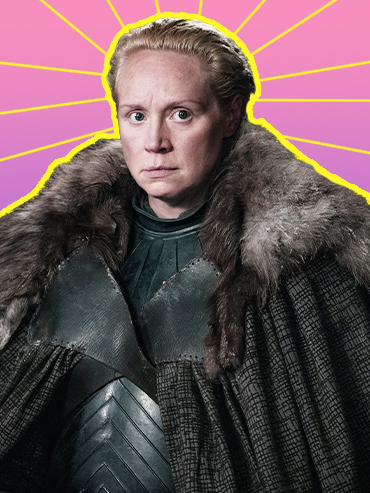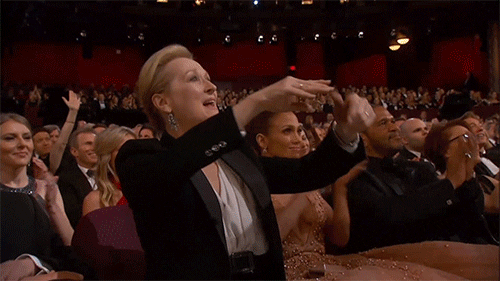Gwendoline Christie’s Emmy Nom Is a Reminder That You a Bad Bitch
And the world deserves to know it


Game of Thrones may be over, but it looks like the ladies of Westeros are still doing it for themselves—or, at least, the actors who play them are. On July 17, the nominations for the 71st Emmy Awards were announced in Los Angeles and among the many talented stars nominated was Gwendoline Christie, who received a Best Supporting Actress in a Drama nod for her role as everyone’s favourite knight, Ser Brienne of Tarth.
https://www.instagram.com/p/Bz_Fqa9gupv/
The actor has been seriously killing it as Ser Brienne since Season 2 of Game of Thrones, but made her way into everyone’s hearts during the series’ final season.
While an Emmy nomination is big news in any capacity, what makes Christie’s first nom so exciting is that the actor submitted herself for the award, taking on the $225 submission fee to put her name in the ring after HBO—the network that owns the show—wouldn’t.
And can we just say, that’s a bad bitch move.

Christie’s actions are serious motivation for any woman who’s proud of her work–and knows others should be too; and she’s not the only one. From Mindy Kaling building an inclusivity empire to the U.S. Women’s Soccer Team (rightfully) celebrating their big World Cup win, these iconic ladies are proving that women are their own greatest advocates and cheerleaders—often, because they have to be.
Women are often condemned for celebrating themselves
While reaction to Christie’s self-advocacy has been largely positive thus far, it’s not always the case. Women are often chastised for self-promotion, from the glitziest of scenarios (like submitting yourself for an Emmy nomination) to the most banal.
I still remember my own private shame when, in high school, I nominated myself for “Best Dressed.”. TBH, I thought I was hot shit and I worked *hard* on my outfits every morning. The halls of Earl Marriott Secondary had no idea what went in to my Forever 21 looks! I made the nomination anonymously, obviously—but not obscurely enough. One of my friends saw my ballot and called me out, asking the most terrifying question in my young, adolescent life: “But why would you nominate yourself?” I had no answer, because saying: “Because I’m the best dressed?” would be seen as arrogant and bold; things I, as a girl, had been taught not to be. I may have been young, but I knew that much.
And when it comes to celebrating your successes—out of the question. On July 7, the U.S. Women’s National Soccer Team won their fourth World Cup tournament. It was an exciting win, but one that was overshadowed by the criticism over how the team embraced their success throughout the tournament. First, the team was criticized for what some deemed as excessive celebration during their 13-0 win over Thailand early in the tournament, with one male sports commentator tweeting that the win left a “sour taste” in his mouth, and musing as to whether the team would apologize postgame (heavily implying that the women *should*).
0.0 problem with the score line as this is THE tournament BUT celebrating goals (like #9) leaves a sour taste in my mouth like many of you. Curious to see if anyone apologizes for this postgame. #USWNT #FIFAWWC https://t.co/XfGh2e2Jms
— Taylor Twellman (@TaylorTwellman) June 11, 2019
Then, after their win against England, forward Alex Morgan was called out for stopping to mime sipping tea while on the field.
Alex Morgan trolling England by sipping tea is LEGENDARY 😭🐐pic.twitter.com/BzIBNx0xzu
— Complex Sports (@ComplexSports) July 2, 2019
Then, perhaps the most salacious affront of all! During the National Team Parade after their championship win, superstar player Megan Rapinoe danced on stage to celebrate. The team, and Rapinoe specifically, were called a “bad sport,” “cocky” and “distasteful,” for their celebrations; and Piers Morgan said Rapinoe: “must surely be a candidate for most annoying woman in world sport.”
Even though we have to advocate for ourselves
By shaming and condemning women for advocating for themselves we’re actually impeding their further success. In many cases, the only way for women *to* succeed is if they advocate for themselves—because a lot of the time, tbh, no one else will.
And Christie is a perfect example of that. None of the doorknobs at HBO were going to recognize her talent, so what was she to do? Just sit back and twiddle her thumbs knowing that she worked *super* hard for her role? No, because she’s Ser Brienne of Tarth.
https://twitter.com/whydoikar/status/1151189006853390336
https://twitter.com/MESalisbury/status/1151810047573446656
It’s a similar situation with Women’s U.S. Soccer team. The reigning World Cup champs have been battling both on-and-off the field for years. Because, despite winning numerous World Cup titles, the women’s team is paid significantly less than the men’s team—actually, $730,000 less, according to stats by The Guardian. This, despite the fact that—not to be rude, but—the men’s soccer team honestly sucks, and the women’s team outperforms the men’s in both viewership and competition. And no one was ready to address that where it counts: in dollars and cents. So on this year’s International Women’s Day, the women’s team sued U.S. Soccer for gender discrimination. Because they know their worth—even if no one else does (yet).
Which, FYI, is something men don’t have to do
What makes this type of criticism so frustrating is the fact that—like many things in life—it’s a double standard. Men don’t often have to advocate for themselves in the same way women do—and we have the patriarchy to thank for that. According to a 2018 Women in the Workplace study by McKinsey and Company, women have less access to senior managers, or people who can accelerate their career, than their male counterparts, with 33% of women reporting they never have substantive interactions with higher-ups compared to 27% of men. The number skyrockets to 41% for Black women. This means less opportunity to showcase their skills and abilities, and fewer advocates to help you achieve milestones in their career.
And what’s even more infuriating? Unlike women, men aren’t scrutinized or chastised in the same way for speaking up or celebrating their accomplishments. Just think of the fact that “touchdown celebrations” in football are seen as quirky character traits or part of a player’s image—so much so that they earn a roundup of the best ones each year and the NFL Honours ceremony includes a category for Celebration of the Year.
And everyone’s favourite team and recent NBA Champions, the Toronto Raptors, were consistently referred to as “humble” throughout their series run. Their championship celebration—which featured a five-hour-long parade where the players drank, danced and speayed champagne into the crowd—was seen as well-deserved. But, when Megan Rapinoe danced on stage it was gloating.
Why are people so scared of women who love themselves?
We’re not exactly sure where *this* animosity towards vocal, celebratory women comes from, but for some reason people are scared of women who know their worth. Because knowing your worth–and loving yourself—can often be misinterpreted as arrogance in women.
But maybe that’s only because it’s so rare to see. Actor, producer and woman I want to be my BFF, Mindy Kaling knows this animosity well. The cool mama and triple threat has faced criticisms throughout her career for being self-congratulatory about her success, owning her self-esteem and being open about her serious work-ethic. And she knows that this often grinds people’s gears.
In her 2015 book Why Not Me?, Kaling addressed the criticism against her, writing: “People’s reaction to me is sometimes ‘Uch, I just don’t like her. I hate how she thinks she is so great.’ But it’s not that I think I’m so great. I just don’t hate myself… And the scary thing I have noticed is that some people really feel uncomfortable around women who don’t hate themselves. So that’s why you need to be a little bit brave.”
https://www.instagram.com/p/Bz8ZEXjFi5c/?hl=en
With the world and society seemingly always working against women, whether it’s not nominating them for their hard work, paying them unfairly, voting their abusers in to the Supreme Court or telling them to go back to their country, are we really surprised that women have a hard time knowing and expressing their worth?
We’re *all* better when women are celebrated
We should take Kaling’s advice, because, let’s be honest: Women make the world go ’round. We know this is a fact because Beyoncé wrote a song about it. And, when women are celebrated for their wins and supported through their struggles, we *all* end up better for it in myriad ways.
In Christie’s case, not only did she inarguably *make* the final season of GoT (seriously, Ser Brienne of Tarth offered a glimmer of goodness in a series that was chock full of darkness), her Emmy self-nomination is an inspiration to others—an indication that you *can* stand up for yourself and that, often, it yields results.
Believe in your sauce & have the work to back it up,so you're not swayed by other people's disbelief. You got you. https://t.co/kHfWp51LWg
— Bolu Babalola (@BeeBabs) July 18, 2019
In Kaling’s case, being her own biggest cheerleader has given her the succcess and platform to start advocating for others in Hollywood. The multi-hyphenate is now building an empire hinged entirely on inclusivity and diversity, both of stories and the people who bring them to life on-screen. For her latest Netflix project—a series based off her life—Kaling put out a worldwide casting call for young Desi women, eventually casting Canadian teen Maitreyi Ramakrishnan. She’s literally fostering new (and diverse) stars—and we’re totally here for it.
And when it comes to the women’s soccer team, they’re starting an equal pay revolution! The team’s global fight for equal pay is drawing in more viewers to watch them actually play, combatting the long-held and seriously stupid excuse that people don’t watch women’s soccer so women shouldn’t get paid equally. *Eye roll*
Their advocacy for their right to equal pay for play has drawn more eyes to discrimination in soccer clubs across the world, and, after their latest championship win, the team was met with chants for “equal pay” from the stadium crowd.
So yeah, they definitely deserve all the praise.

And so do you.
Megan thee Stallion said it’s a Hot Girl Summer. So, who’s a bad bitch?

Don’t let them forget it.
Related:
Mindy Kaling’s Late Night Feels Like Foreshadowing in the *Best* Way
That Sansa vs. Dany Showdown is a Reminder That Feminism Doesn’t Mean Blind Support
Emilia Clarke Is Over the Term “Strong Woman”—and So Are We








